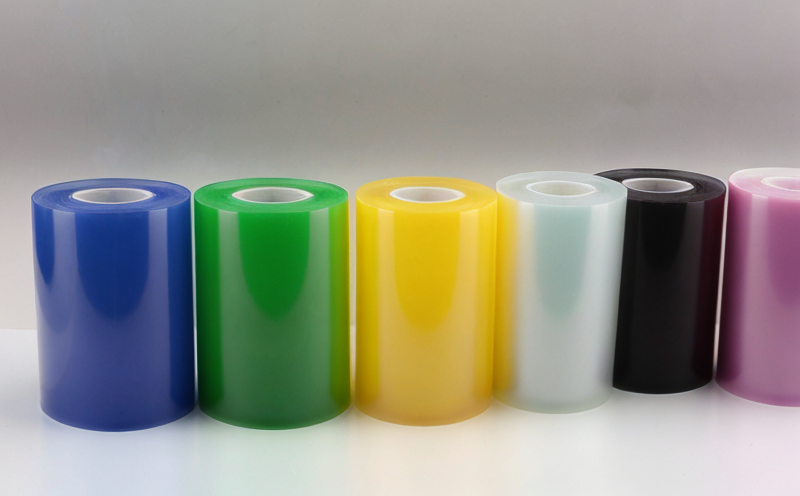EN ISO 527-3 Tensile Testing of Plastic Films
The CEN, through its technical committee CEN/TC 189, has developed the standard ISO 527-3. This norm specifies the methods for tensile testing of plastic films and sheets in accordance with ISO standards.
Tensile testing is a fundamental mechanical property test used to evaluate the strength and other physical characteristics of materials such as plastic films, which are widely used across various industries including packaging, electronics, automotive manufacturing, and medical devices. This particular standard is particularly important for quality managers, compliance officers, R&D engineers, and procurement teams who need reliable data on material integrity.
Plastic films are characterized by their flexibility, durability, and ability to withstand environmental stresses while maintaining functionality. The tensile testing method according to ISO 527-3 provides a precise way to measure key properties such as tensile strength, elongation at yield or break, modulus of elasticity (Young’s Modulus), and stress-strain relationships.
The test is performed using a universal testing machine equipped with appropriate fixtures. Specimens cut from the film are carefully prepared following strict guidelines outlined in ISO 527-3 to ensure accurate results. The specimens undergo loading until they break, at which point critical parameters like peak load and extension are recorded.
Understanding these properties is crucial for industries relying heavily on plastic films because it helps them meet regulatory requirements while optimizing product design and performance. For instance, the packaging industry uses this information to ensure that their products can withstand various environmental conditions without compromising safety or quality.
The results from tensile testing are used not only in manufacturing processes but also during material selection stages where engineers compare different types of plastic films based on their mechanical properties. This allows for better decision-making regarding which type of film should be utilized depending upon the specific application requirements.
Furthermore, compliance with ISO 527-3 ensures that manufacturers adhere to international best practices when conducting tensile tests on plastic films. By adhering strictly to these standards, organizations can demonstrate their commitment to producing high-quality products while maintaining consistent performance across different environments and climates.
For those responsible for quality assurance within manufacturing facilities, understanding the nuances of ISO 527-3 is vital in ensuring that all testing procedures follow industry best practices. This includes proper specimen preparation, appropriate fixture selection, accurate measurement techniques, and meticulous record keeping throughout each stage of the test process.
The application of this standard extends beyond just manufacturing; it plays a significant role in research and development efforts aimed at improving existing products or developing new ones. Engineers often use these standardized testing methods as benchmarks against which they can compare experimental findings, thereby facilitating innovation within their respective fields.
In summary, the EN ISO 527-3 tensile test is an essential tool for assessing plastic films' mechanical integrity and durability. By following this internationally recognized standard, companies across various sectors can ensure consistent quality in their products while meeting regulatory requirements and fostering continuous improvement through rigorous testing practices.
Benefits
- Ensures compliance with international standards.
- Provides reliable data for product development.
- Safeguards against potential legal issues related to non-compliance.
- Supports continuous improvement efforts by providing consistent performance metrics.
- Facilitates effective communication between suppliers and customers regarding material specifications.
Environmental and Sustainability Contributions
- By ensuring that plastic films meet strict mechanical property requirements, ISO 527-3 helps reduce waste by promoting the use of high-quality materials.
- The standard encourages manufacturers to explore more sustainable alternatives where feasible without sacrificing performance.
- Through rigorous testing practices, this method supports efforts towards circular economy initiatives by encouraging recycling and re-use of plastic films when they reach end-of-life.
Use Cases and Application Examples
| Application Example | Description |
|---|---|
| Packaging Industry | Tensile testing helps in selecting appropriate plastic films for packaging applications based on their mechanical properties such as tensile strength and elongation. |
| Automotive Manufacturing | Ensures that the plastic films used in components like seat covers or dashboard trimmings are capable of withstanding various environmental stresses during vehicle operation. |
| Medical Devices | Promotes the use of durable and flexible plastic films for medical packaging to ensure product integrity throughout distribution channels. |
| Electronics Industry | Supports the development of reliable electronic components by ensuring that their protective casings can withstand mechanical stresses during assembly processes. |





